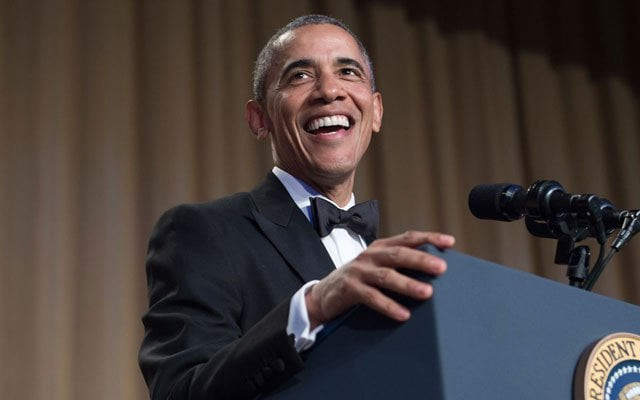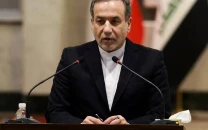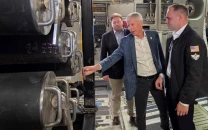Is Barack Obama the new Jimmy Carter?
Since signing the nuclear deal with Iran, comparison between Obama and Carter have became more widespread

Since the Obama administration signed a nuclear deal with Iran and lifted sanctions, comparison between his presidency and the Carter era became more widespread. PHOTO: AFP
Though the papers released for public knowledge are not solely focused on the Iranian leader’s secret engagement with US, they form a small percentage of a trove of various policy memos, minutes of the meetings and diplomatic cables.
Obama offers Iranian holiday greetings, heralds new 'future'
The last message from Khomeini noted that the Iranian military heeded US advice while the public was on his side, thus it was time for Washington to read the situation correctly and pave the way for his return and takeover. In quid pro quo, he promised to calm the nation and secure US interests and citizens there. While the Iranian supreme leader is no more, Tehran has termed the document fake.
Au contraire, back in November 1963 Khomeini first reached out to US from house arrest. The Kennedy administration did not respond encouragingly and backed the Shah ardently. His message sent through Dr Mirza Khalil Kamarei, a professor at Tehran University, specifically stated he would not harm US interest. The document also recorded, “on the contrary, the US presence was a necessary counterbalance to the Soviet and possibly British influence.”
The secret contact between the exiled leader and the staunch ally of Iran’s Shah occurred during the two weeks of underground meetings of his aides and US diplomats in Paris.
The secretive shuttle diplomacy in France clearly suggests the Iranian cleric was far from calling US big satan and rather promised neutrality. The ayatollah was seeking American support in calming down the Iranian military loyal to Shah, besides searching for enabling conditions to land in Tehran from Paris suburbs.
Back at home, Iran was divided and brewing with tension. Shapour Bakhtiar, the then prime minister, was deeply unpopular and cancer-ridden Shah had military on his side. The clashes between security forces and the Khomeini supporters evidently reflected that any transition of power would not be bloodless and short.
The Iranian premier had thwarted the cleric’s planned return in late January by deploying Imperial Guards at the airport, while the opposition feared American role against them if the situation aggravated further.
Obama hails Iran breakthroughs as vindication of engagement
One of the cable records Khomeini’s message to US: "You will see we are not in any particular animosity with the Americans. The Islamic Republic will be a humanitarian one, which will benefit the cause of peace and tranquility for all mankind.”
Beyond quite signals and messages, there were also face-to-face meetings between emissaries. Few days after Shah left Tehran for vacations, a US diplomat reportedly told a Khomeini aide that the nation was open to abolishing monarchy protected by the constitution. Washington had given away too much to the enigmatic cleric, who was not showing all his cards on the table. Without White House support for its former ally in Iran, the nation was doomed and it proved only a matter of time.
In one crucial meeting with his advisers, the US official is recorded in a document to have stated: "We do not say that the constitution cannot be changed, but we do believe that the established, orderly procedures for making changes should be followed. If the integrity of the army can be preserved, we believe there is every prospect the leadership will support whatever political form is selected for Iran in the future." Not only Washington committed to help Khomeini with military’s response to his return but also expressed readiness for abolishing the monarchy.
Misreading the situation for years, the Carter administration suddenly found itself in the midst of a storm without serious fallback position. Washington’s sole plan was to use military launch as a coup against the prime minister and then cut a deal with Khomeini-led opposition.
The then Ayatollah constantly reassured US that he was a pragmatic and rational actor and will not act reactively whenever in power. The White House subscribed to it.
The documents also record a meeting of US ambassador William Sullivan on January 24th with members of the Islamic Revolutionary Council, including Ayatollah Mousavi Ardebili who later ordered executions of thousands of political opponents as the chief justice.
In reality, Ebrahim Yazdi conveyed Khomeini’s final message to US on January 27th stating: “it is advisable that you recommend to the army not to follow Bakhtiar."
Four days later, things took different turns when Khomeini landed in Tehran. Four top generals were executed atop a school building followed by thousand other assassinations. The new owners of Iran sternly followed the notion of ‘ends justify the means’. Now, Washington was declared as a big satin.
The Carter administration, despite its numerous foreign policy successes, could not stand up to the occasion. Iran was no more an ally. It was not even neutral. Not keeping to his commitment of ‘non-interference in other people's affairs’, the supreme leader vowed to export the revolution.
Unlike Ardebili, Yazdi, who used Khomeini’s de facto chief of staff, was not given any role after the takeover. Instead, he was branded as pro-US. He was also denied credibility after the clerics fired him in case he spilled beans regarding contacts with US, which Iran may never admit to.
Since the Obama administration signed a nuclear deal with Iran and lifted sanctions, comparison between his presidency and the Carter era became more widespread. The US foreign and security policy community largely believes the White House has erred by hastening the nuclear deal. They fear clerics exploited Washington’s willingness to ink the deal, just as they did weeks before ousting the Shah.
International sanctions lifted after Iran complies with nuclear deal
The idea that President Obama is Jimmy Carter redux has not yet won too many takers. However, Iran’s elusive long-range ballistic-missile program, growing appetite for influence not only in the GCC and Levant regions but also in Central Asia and North Africa are seen as signs of times to come.
Being a neighbour, Pakistan has found the Ayatollah-led Iran more intervening and difficult to deal with its predecessor. The forecast for the times to come seems alarming too. While Tehran sees Delhi as a strategic partner, the Islamabad finds it southwestern border too porous and vulnerable.
Naveed Ahmad is a Pakistani investigative journalist and academic with extensive reporting experience in the Middle East and North Africa. He is based in Doha and Istanbul. He tweets @naveed360


















COMMENTS
Comments are moderated and generally will be posted if they are on-topic and not abusive.
For more information, please see our Comments FAQ